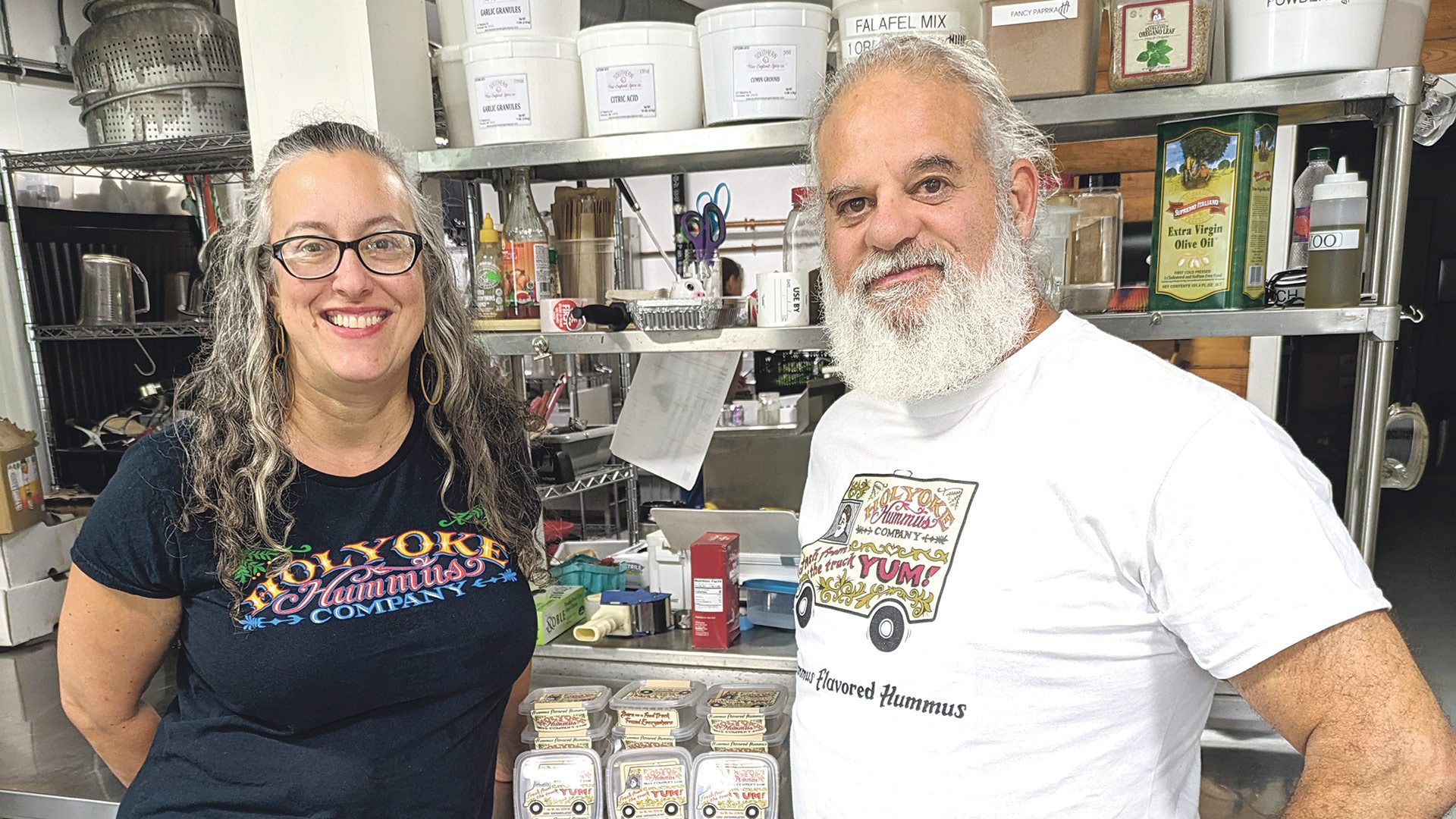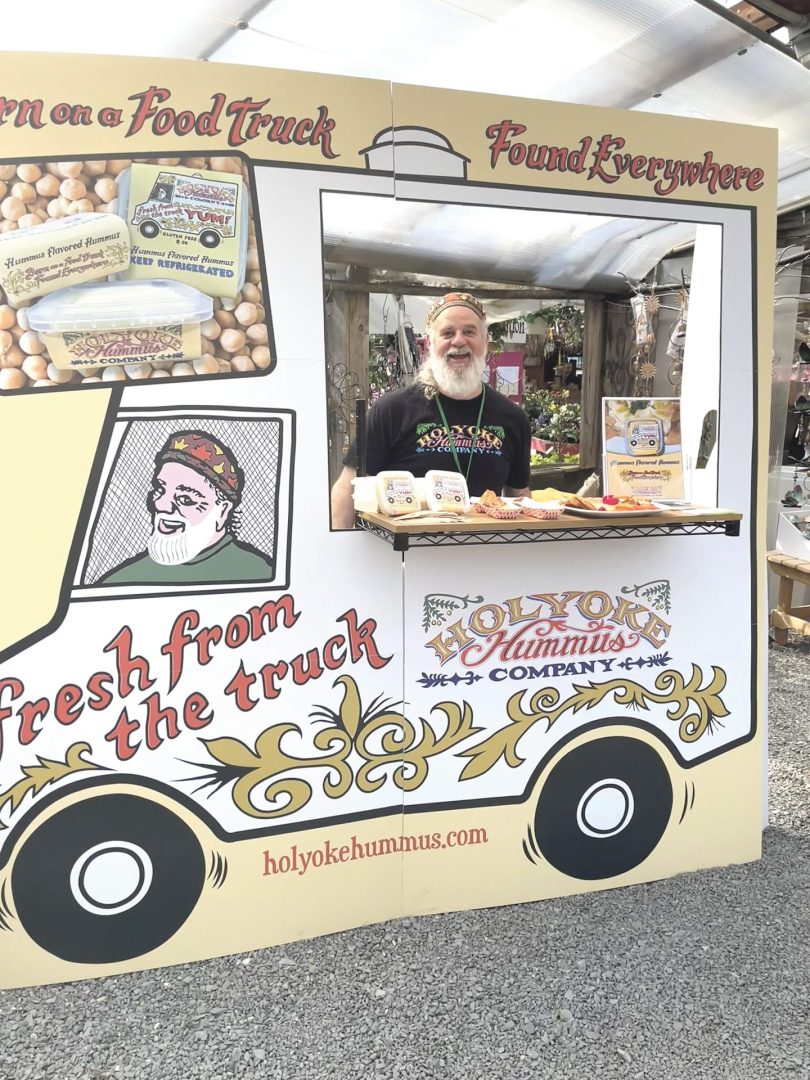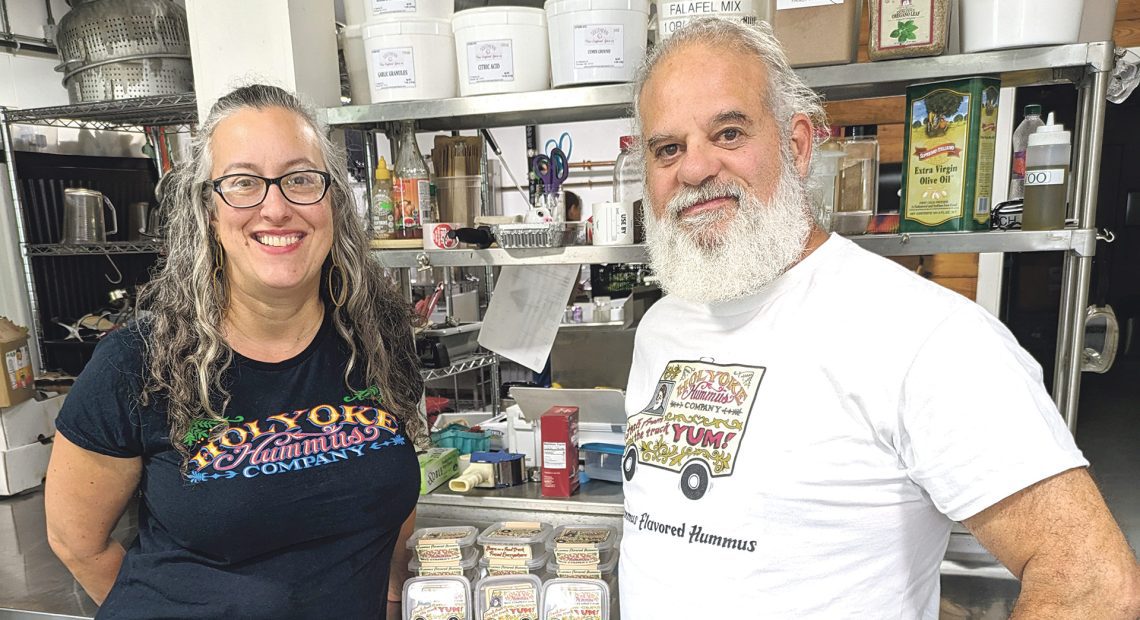More Than a Food Truck

Owners Dawn Cordeiro and John Grossman
John Grossman and Dawn Cordeiro know how to pivot.
Not long after launching a successful food-truck enterprise called Holyoke Hummus in 2014, they saw an opportunity to open a storefront on High Street in Holyoke, called the Holyoke Hummus Café.
“We had that for four years, and it was just amazing to be there on High Street while also doing the truck, but it was a lot of work keeping both of those going,” Grossman recalled. “And when the pandemic happened, the foot traffic on High Street got so small that we couldn’t keep the restaurant open. We didn’t know what was going to happen. It took a few months before food trucks were even allowed to start serving again.”
But while COVID effectively killed the café, the food-truck business — specializing in falafel and hummus — continued to thrive, with regular appearances, about 10 months a year, on area streets and at events and festivals.
“We’ve been trying to find something more productive for us during the winter. We’ve always done catering, but the wholesale project, getting hummus into the grocery stores, we knew was a year-round proposition.”
“The food truck was great for us during lockdown because restaurant lobbies weren’t open. So we pivoted back to the truck and had a couple of temporary kitchen situations after we closed the restaurant,” Grossman recalled. Then, two years ago, he and Cordeiro, his wife and business partner, set up shop in the shared commercial kitchen of Mycoterra Farm in Deerfield.
“A friend of mine saw on their Facebook feed that they were starting to rent their kitchen out,” he noted. “It seemed remote to me, especially coming from from Holyoke, but then I started to think about the geography, and so much of our work was north of there. So we’re just as close to, say, our Northampton work as we were in Holyoke. And when I came to visit the kitchen, I saw what a great fit it was. I’ve always been looking for something that could accommodate the food-truck production as well as wholesale production.”
Which leads us to the latest pivot — the launch, three months ago, of Holyoke Hummus’s wholesale distribution business.
“Since we started 10 years ago, people were like, ‘oh, where else can I buy your hummus?’ We never planned to have a restaurant, but that happened, and we took that opportunity,” Cordeiro recalled, adding that wholesale was something they had long discussed as well. “We got to 2024, and I was like, ‘we have to make this work this year. This needs to happen.’”
While the truck is typically active from late winter through the end of December, outdoor events definitely slow down in January and February, and the couple saw wholesale as something they could do year-round.

The Holyoke Hummus truck is active about 10 months of the year, John Grossman said.
“During the pandemic, we stayed open through the winter, out of necessity. But we’ve been trying to find something more productive for us during the winter,” Grossman said. “We’ve always done catering, but the wholesale project, getting hummus into the grocery stores, we knew was a year-round proposition.”
After completing the process to get their wholesale license, they connected with a nonprofit food distributor based in Brattleboro, Vt. called Food Connects.
“We do not want to be in the business of driving around and trying to figure out how to distribute. They know how to do that. We know how to make hummus, and we know how to talk to people about it and get them interested and excited about it.”
They’ve Bean Entrepreneurial
Backing up a bit (well, 10 years), Grossman has often told the story of how Holyoke Hummus started, when he attended the Holyoke Brick Race, an annual stock-car event in the Paper City, in 2013. Organizers arranged for food vendors, but none showed up. That was his inspiration for opening Holyoke Hummus, buying the truck known as the Great Garbanzo, and setting up shop across the region.
“We do one flavor of hummus on the truck, and people love the hummus; people have been asking us where they can we get the hummus when the truck isn’t out.”
He and Cordeiro hope the wholesale business sees similar growth and success. They intend to expand gradually and purposefully, starting at locally owned stores like Provisions, Cornucopia, Oliver’s Farmstand, and Brattleboro Food Co-Op.
“Food Connects serves 250 stores — including places that are very far away that we would never even know about, in Vermont and New Hampshire. But hyper-local was where we really wanted to start,” Grossman said, adding that he isn’t looking to get into large chains like Big Y — for now, anyway.
“That’s certainly something that we would consider, and I know that they’re very good to local distributors and local producers,” he told BusinessWest. “But we really want to build this business on our own terms. I’ve seen so many food businesses our size that can’t wait to get into the bigger chains, and they figure out how to ramp up production, and they invest in infrastructure and production, and then that giant account goes away. So we feel really great about the organic growth and interest that we have.”

The company began wholesaling to area stores with just one product: the wittily named “hummus-flavored hummus.”
Food Connects specializes in those independent retailers and food co-ops, he added. “They’re pointed right at the people who we feel like would be buying us anyway. So we’ll grow in the kind of places we want to grow, using the food-truck business to bootstrap our way into the wholesale hummus business. That’s been giving us the capital that we need, as well as the PR capital.”
Another way Holyoke Hummus is starting slowly is with the items it’s wholesaling — or, more accurately, item.
“We’re doing one flavor. We’re doing hummus-flavored hummus. That gets a good chuckle from people all the time, and it resonates,” Grossman said.
“There are a million flavors of hummus out there, and everybody’s got their favorite, and that’s wonderful,” he went on. “But what food trucks do is focus on one thing. And you want to go back to that truck because you want to have that falafel or that pulled pork. It struck us that we do one flavor of hummus on the truck, and people love the hummus; people have been asking us where they can we get the hummus when the truck isn’t out.”
“I want to make sure that the business model is sustainable and something we know we can grow confidently before we start with other products.”
He said the inspiration for calling the packaged product ‘hummus-flavored hummus’ came from an ad campaign for Tito’s Handmade Vodka, which, for a while, pitched ‘vodka-flavored vodka,’ striving for authenticity in a vodka market overrun by trendy flavors.
“It’s the same kind of concept, and I really like it,” he noted. “It’s also easy when I’m talking to new stores and they say, ‘OK, how many SKUs do you have?’ ‘I’ve got this one SKU.’ ‘Oh, I can fit that in.’”
But the wholesale products will broaden, Grossman was quick to add.
“The next thing up, that people are very excited about, are our pita chips: ‘when are you going to do the pita chips?’ That’s probably something that I would turn to a co-packer for and not try and develop my own capacity to produce on a wholesale scale,” he explained. “But I really want to do the hummus very carefully, and I want to make sure that the business model is sustainable and something we know we can grow confidently before we start with other products.”
In a typical week, Holyoke Hummus focuses on food production on Monday, packaging and distributor pickup happen on Tuesday, and the food-truck activity typically takes place Thursday through Sunday, at places ranging from food co-ops to concerts and parties.
On the week, they spoke with BusinessWest, Grossman and Cordeiro were getting ready for a brewfest at the Norman Rockwell Museum in Stockbridge, a 50th-anniversary party at Cummington Supply, concerts at Look Park in Northampton and Tree House Brewing Co. in Deerfield, and a food-truck roundup in Brattleboro. “That’s a pretty heavy week — usually it’s two or three truck events,” Grossman said.
Cordeiro said it’s gratifying to be ingrained in the Pioneer Valley community through the truck and, now, through stores. “It’s exciting that we’re part of people’s milestones. I’ll hear, ‘my mom has loved you for the past 10 years. We’d love to have you at her 70th birthday party.’”

Holyoke Hummus has become a popular sight at local events that welcome food trucks.
Meanwhile, at weekly events like farmers’ markets in Northampton, fans will take home hummus for their fridge, she added, so it’s gratifying to be able to tell them, “by the way, you can get it in the store.”
Falafel-y Promising
The truck fare from Holyoke Hummus has remained fairly consistent over the past decade and now includes a variety of falafel sandwiches and plates; hummus served with pita chips, a soft pita, or carrots; and sides ranging from fried brussels sprouts to french fries to stuffed grape leaves.
“It’s authentic,” Cordeiro said, of both the food and the relationships they’ve built over the years. “We’re a trusted part of the community, and that’s lovely. These people are part of our lives.”
Grossman agreed. “The nature of our business is breaking bread with people. That’s what being in community events is all about — it’s a very connecting thing of eating food with people and sharing food with people. We really love that.”

And while they grow the wholesale business, they also see expanding opportunity with the food truck, and a Western Mass. market that is far from saturated. “It’s kind of like asking, are there enough restaurants out there?” Grossman said.
“Partnerships are really what make food trucks happen,” he went on. “If you’re not in a fixed location, a retail location where people are making it a destination, you need to have an Abandoned Building Brewery say, ‘we’re going to do Food Truck Friday and bring 1,000 people together,’ and make partnerships that way. And the concert venues — Tree House is doing so many more shows now than they did before. So the cultural growth of food trucks, in partnership with more venues, is still definitely on the rise.”
Some of those partnerships are long-lasting; one of Holyoke Hummus’s earliest events was at Abandoned Building’s first anniversary, and it just had a presence at the Easthampton brewery’s 10th anniversary.
Relationships with local cities and towns are important, too, Cordeiro added. “Even the restaurant community understands that, ‘oh, right, food trucks aren’t going to take away from our business. How can we work together?’”
As it enters its second decade, the couple have recognized their growing stature as mentors to newcomers on the food-truck landscape.
“That’s been a really nice thing for us as well, talking to trucks coming on the scene over the last couple of years,” Grossman told BusinessWest. “When I was starting out, I know I was running around, hanging out at other trucks, asking them questions. There were some really great trucks that answered my questions and were helpful; they were sort of like the elder statespeople of food trucks in the Valley. They were scrappy and doing it when there were far less opportunities. To become that food truck that’s able to help and talk with other trucks as they get going, that’s been exciting.”






